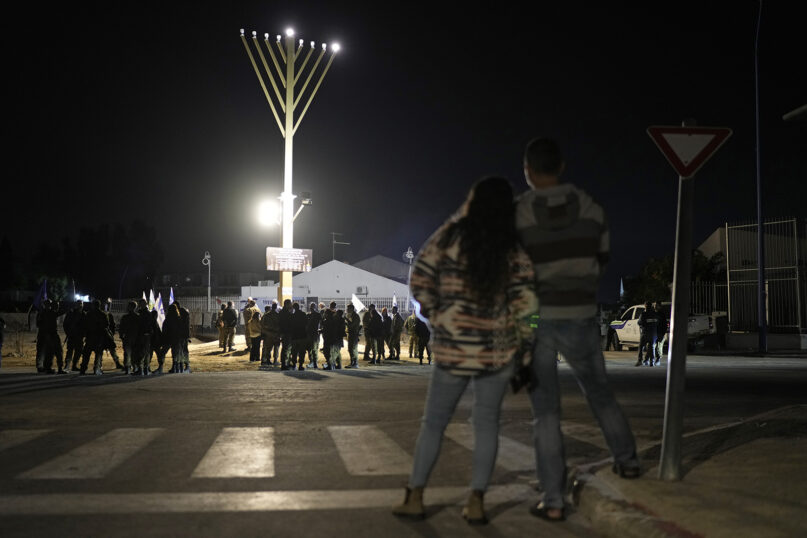Hanukkah: It’s complicated (especially this year)
It will be a subdued Hanukkah this year, no doubt.

(RNS) — Hanukkah is complicated. Is it purely Jewish? Or does it express more universal themes? What really was the miracle? And how can we celebrate miracles at all this year, following Oct. 7? We can’t even decide how to spell this enigmatic holiday in English. According to the Oxford Dictionary, there are 24 ways.
Nothing about this festival is as it seems. For one thing, it’s the holiday the ancient rabbis wanted to get rid of. They hated the Maccabees — primarily because their descendants, the Hasmoneans, became corrupt rulers — and devoted very little space in the Talmud to discussions of this holiday. Purim gets an entire tractate, Hanukkah barely a page. But it was too popular to get rid of. So, the rabbis tried to gerrymander it to adhere to their non-militaristic vision.
Some have asked me how we can say, in the blessing, that we are “commanded to light the Hanukkah candles,” when Hanukkah is not in the Torah and doesn’t seem to have been commanded anywhere. The rabbis got around that one by invoking a verse from Deuteronomy ascribing special authority to sages living during the Second Temple period. The idea is that the verse gave these sages authority to give a non Torah activity “mitzvah” status, to be included among the 613 commandments. So a new commandment was shoehorned into the Torah for a holiday that’s post-biblical.
Even the simple dreidel game, one of Hanukkah’s best-known customs, is complicated. It’s in fact derived from an English and Irish medieval Christmas custom. Sorry, Virginia, it’s one of those freaky ironies of Jewish history that in order to celebrate a holiday that marks our victory over cultural assimilation, we play a game that resulted from cultural assimilation.
As we delve more deeply into Hanukkah we find other examples of cultural borrowing with a common theme. What this season is about, after all — for so many cultures — is the spiritual power of fire and night, a motif that fits right into this eight-night celebration.
In a technological society, one of the great purposes of religion is to enable human beings to return to the bare essentials of life. In our age, religion serves as a sort of paint stripper, removing layer upon layer of artificiality, reminding us of who we are and where we come from, begging us to embrace simplicity. With artificiality currently a major concern and authenticity at a premium (“authentic” is Merriam-Webster’s word of the year for 2023), we yearn to get back to basics.
Hanukkah is the holiday of fire and night, two of creation’s most basic, necessary and feared phenomena. The festival comes at a time when the days are shortest and even the night sky is at its darkest since it’s the end of the Jewish month. With no sun or moon to light up the sky, and December’s winds blowing briskly, it is up to us to create the fire that will sustain us physically and spiritually while the days begin to grow longer and the moon larger.
On Hanukkah we light that fire, demonstrating that human beings have the capacity to create light and harness the power of fire. That’s why it’s possible for so joyous a celebration to occur at so dark a time of year. The fact that Hanukkah begins on the 25th of the Jewish month of Kislev and Christmas occurs on the 25th of December is not entirely coincidental. Both holidays are responding to the universal and ancient (and, originally pagan) need to light up the night of winter as the shortest day passes — it’s a need that gave rise to all the winter festivals celebrated throughout the world. It is the bond that links the flickering Hanukkah menorah to the Christmas tree, and it is a need that predates both.
Christmas originally was moved to the winter months in order to compete with Zoroastrian and then European pagan celebrations. Also, at this time of year, Hindus in India and all over the world celebrate Diwali (or Deepawali), a festival of lights as big as Christmas is for Christians. And the Chinese New Year, which is close at hand, is also a festival of light featuring lanterns and flames.
So, cultures share. That is a fact, and one Jews should celebrate. We are all human beings, after all, with the same fears and hopes.
But Jews also celebrate the uniqueness of the Jewish experience, with our great heroes of the battlefield and of the spirit. Which is why the Hanukkah menorah that is glowing this week in Sderot on the ruins of the police station destroyed by the attack of Oct. 7 is so brimming with resonance. The fact that our ancestors had the faith to light the lights of the temple, even when all seemed so hopelessly dark, is reflected in those lights in our own day.
It will be a subdued Hanukkah this year, no doubt: to speak of divine favor at a time when no Maccabean miracle was in sight on Oct. 7, when so many had to wait for what must have seemed like eight days for help to come. And some are waiting still. And for some, time ran out all too soon. Too many lives have been extinguished to focus on cheap candle tricks right now. We are aiming for a much bigger miracle.
One that began, for Jews, with the return to their homeland in 1948, but also, for all of humanity, much, much earlier, long before monotheists roamed the earth. The miracle is one of the human spirit and the Jewish spirit. Not one or the other, but both simultaneously. What we see this week in Sderot has been seen so often before: the quest for spiritual resilience and hope, generated not by might nor by brute power, but by the illuminating spiritual power of a flame in the night and the courage to light one singular candle.
That is the miracle we seek.
(Rabbi Joshua Hammerman is the spiritual leader of Temple Beth El in Stamford, Connecticut, and the author of “Mensch-Marks: Life Lessons of a Human Rabbi” and “Embracing Auschwitz: Forging a Vibrant, Life-Affirming Judaism That Takes the Holocaust Seriously.” Sign up for his Substack newsletter and check out his website at https://www.joshuahammerman.com. The views expressed in this commentary do not necessarily reflect those of Religion News Service.)
https://religionnews.com/2023/12/08/hanukkah-its-complicated-especially-this-year/





No comments:
Post a Comment